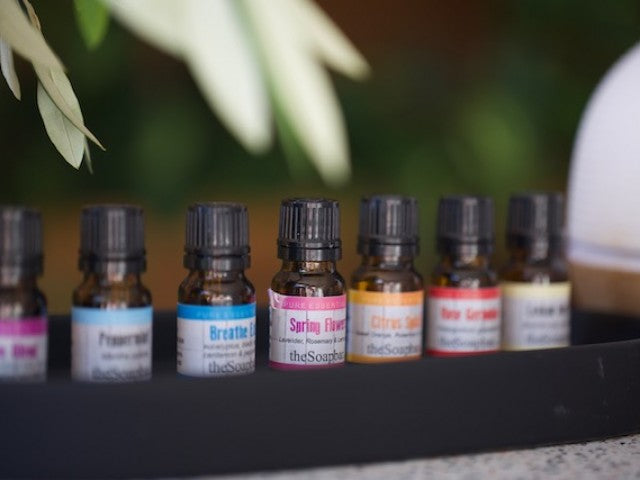The popularity and interest in essential oils has risen dramatically over recent years.
At the Soap Bar conversations with our customers suggest several reasons for this,
- consumers are choosing natural substances over synthetic
- consumers want the best for themselves and their family
- the rise of MLM companies, raising awareness and providing education.
However, during these conversations we have become a little alarmed at some of the misinformation that we believe is being disseminated. Many people believe that the cost of an oil is indicative of its quality. Whilst some oils ARE more expensive, due to the cost to extract the oil and/or the amount of the plant required to extract the oil, some of the cost of the oils, particularly those obtained from MLM companies is purely due to number of people that are being paid up the chain from your purchase. We don’t wish to single out MLM oils, as they are no doubt good oils, but are they better because they are more expensive? These companies are not producing the oils, they are merely purchasing them and rebranding them from wholesalers as other companies do.
The use of essential oils and plant compounds is not new:
The use of essential oils for their aromatic properties appears to date back to Ancient Egypt. They likely burned them in incense, used them in perfumery, cosmetics and even mummification. The three wise men gave Jesus frankincense as one of their gifts. They were used in Ayurvedic medicine in India. Today they are often used as an adjunct to conventional medical treatments in the form of aromatherapy and massage. Their scope for use medicinally is broad, however their parameters are not defined or tested empirically, so safety is not ensured if used indiscriminately.
But what IS an essential oil???
Many people are not really sure what an essential oil actually is. Quite simply, it is the oil that is obtained from the plant – the ‘essence’ of the plant. They are volatile (they evaporate – thus releasing their aroma) and hydrophobic (they don’t dissolve in water). They are exceedingly complex compounds produced in the plant via metabolic pathways. This brief outline cannot go into the thousands of aromatic compounds that are produced within plants. They have antibacterial, antifungal and antioxidant qualities that allow the plant to survive by controlling its environment.
What about purity?
There are a lot of confusing adjectives that go along with the term essential oil. Theoretically, no adjective should be required, however the term ‘100% pure’ is often used to denote that the essential oil has not been diluted with a carrier oil.
Recently, the term ‘therapeutic grade’ has emerged. There is no industry standard governing what would make an oil therapeutic over another oil of the same plant, so essentially this is a marketing strategy designed to make customers feel they are obtaining a higher quality oil. If an oil is pure – that is not adulterated in any way, then it is has the same therapeutic qualities as the oil labelled ‘therapeutic grade’. Essential oils are identified in the laboratory by their chemical constituents via chemical analysis using sophisticated processes like gas chromatography to ensure each oil falls within the reference range for the species.
Each species of plant has a slightly different aroma due to the differences in aromatic compounds that make up the plant. For example; there are over 45 species of lavender and over 450 varieties. Essential oils, as we have established are natural; they are the essence of a living plant. Plants, like animals and humans all have slightly different expressions of their genes, resulting in differences in appearance within the same species. In addition to this, the time of harvest, the maturity of the plant and environmental conditions in the areas where it was cultivated can alter the aroma of the oil.
How do you use them?
Essential oils are highly concentrated and should not be ingested. For example; to obtain a 10ml bottle of pure peppermint oil it takes approximately 2.8kg of peppermint leaves. If you were going to ingest even 1ml of the oil, you would be ingesting more than a quarter of a kilo of leaves.
They should also not be applied ‘neat’ to the skin; that is not diluted in a carrier oil. This can result in sensitivity, irritation and allergic reactions.
We advise most oils be used in the form of vaporising in a diffuser or added to a carrier oil for massage or application to pulse points. We also advise that if using them as a complementary adjunct to a medical condition to work with a medical professional. Some essential oils should be avoided during pregnancy.
The Soap Bar exclusively uses essential oils in their hand made soaps and bath bombs. The Soap Bar bath bombs have an emulsifier added to the oil to allow the oil to be dissolved into the water, making it safer for skin contact. We buy our oils in bulk from reputable wholesalers who provide us with batch numbers and gas chromatography reports so you can be confident in the purity of our oils.


